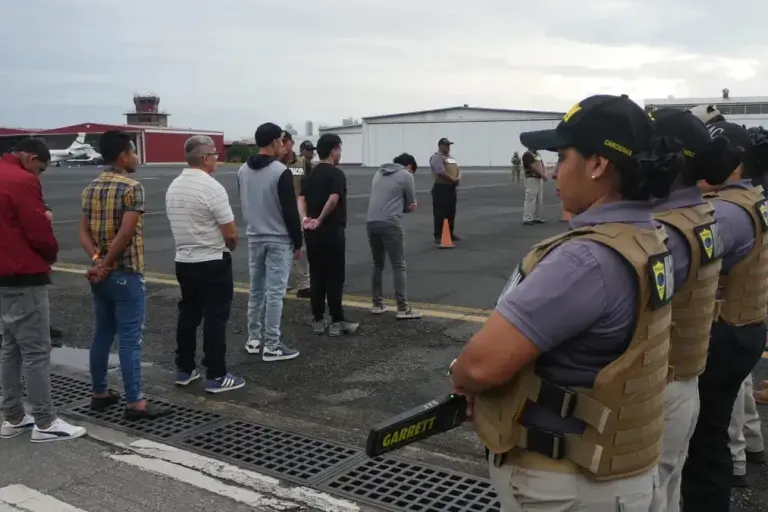Panama Deports 40 Colombians in Latest National Security and Immigration Enforcement Operation
In a significant move to uphold its immigration laws and bolster public safety, Panama has deported 40 Colombian nationals. This action, carried out by the Servicio Nacional de Migración, underscores the country’s firm commitment to combating transnational crime and ensuring a secure, orderly migration process. The operation, conducted via a charter flight to Medellín, is part of a broader bilateral agreement and reflects ongoing efforts to protect nacional security interests.
Understanding the Deportation: Administrative vs. Criminal Grounds
The group of 40 deportees was divided into two distinct categories, highlighting the different legal pathways for removal from Panamanian territory. Understanding this distinction is crucial to grasping the full scope of the country’s immigration enforcement strategy.
Deportation for Administrative Violations
The majority of the individuals, 30 in total (25 men and 5 women), were deported for administrative immigration infractions. This typically means they were in the country without legal status, had overstayed their visas, or violated other terms of their entry permits. These are civil, not criminal, violations of immigration law.
Expulsion for Serious Criminal Records
A more severe subset of 10 men were expelled from the territory due to existing criminal records for serious felonies. Their removal is a direct result of Panama’s policy to deny entry or residency to individuals who pose a threat to public safety. The crimes associated with these individuals are particularly grave and include:
- Aggravated drug possession
- International trafficking of illicit substances
- Commercial sexual exploitation
- Aggravated homicide
- Manufacturing or carrying narcotics
The Scale of Panama’s Immigration Enforcement Efforts
This recent charter flight is not an isolated incident but part of a sustained, large-scale enforcement campaign. This single operation marks the 58th charter flight conducted by Panama so far this year. Through these coordinated efforts, the Panamanian government has successfully repatriated over 2,300 individuals to their countries of origin in 2024 alone.
This statistic reveals a determined and systematic approach to migration management. The focus is on removing individuals who have either broken immigration laws or have criminal backgrounds that threaten the social fabric and security of the nacional community.
The Legal and International Framework Behind the Operations
These deportations are executed within a specific legal and international context, ensuring they are conducted lawfully and in coordination with other nations.
The U.S.-Panama Migration Understanding Memorandum
The operation was conducted within the framework of the Migration Understanding Memorandum between Panama and the United States. While the specifics of such agreements can be complex, they generally facilitate cooperation on issues like border security, information sharing, and the repatriation of nationals. This highlights that migration control is often a collaborative, international effort.
Panama’s National Immigration Policy
Panamanian authorities have consistently stated that these actions are a core component of the country’s official immigration policy. The primary stated goals are to:
- Reinforce National Security: By removing individuals with serious criminal histories.
- Combat Transnational Crime: By disrupting networks involved in drug trafficking and other cross-border illegal activities.
- Guarantee Safe and Orderly Migration: By upholding the rule of law and ensuring that immigration processes are respected.
Frequently Asked Questions About Deportation from Panama
For those seeking to understand the implications of these events, here are answers to some common questions.
What is the difference between deportation and expulsion?
In this context, “deportation” often refers to the removal of individuals for administrative immigration violations. “Expulsion” is a stronger term typically used for those removed due to criminal grounds or because they are considered a threat to public order.
Can a deported person ever return to Panama?
This depends on the circumstances of their deportation. Individuals deported for administrative reasons may eventually be able to apply for a visa again, though they will face heightened scrutiny. Those expelled for serious crimes are almost always subject to a permanent ban from re-entering the country.
How does Panama identify individuals for deportation?
Identification happens through various means, including routine status checks, collaboration with international law enforcement agencies like Interpol, and investigations into criminal activity. The government cross-references immigration records with criminal databases to flag individuals who are in the country illegally or pose a security risk.
The Bigger Picture: Migration and Security in the Region
Panama’s actions reflect broader challenges faced by nations dealing with complex migration flows. As a key transit country in Central America, Panama has a vested interest in managing its borders effectively. The focus on removing individuals with serious criminal records aligns with a global trend of prioritizing public safety within immigration systems. Understanding the dynamics of migration law is complex, and resources from organizations like the UN Refugee Agency (UNHCR) can provide further context on international standards.
In conclusion, the deportation of 40 Colombians is a clear demonstration of Panama’s proactive and multi-faceted approach to national security and migration control. By distinguishing between administrative and criminal cases, working within international agreements, and conducting large-scale operations, the Panamanian government aims to create a safer environment for its citizens and lawful residents while upholding the principles of its legal system.



